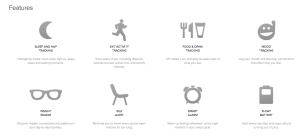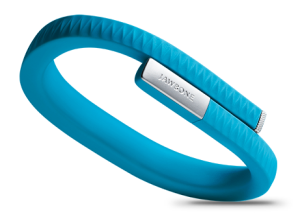I just read about this bracelet thingie called an UP ($129.99).
Inspired by a pedometer, this gadget captures data like your quality of sleep (based on how much you toss and turn), spans of idleness (you can set it to alert you when you've been overly still), and how much you've moved through the day. It also prompts you with a “mood tracker” to help you see correlations between your patterns of movement and how you feel.

As an undergrad, I took a class where we analyzed data collected from our heart rate monitors after wearing them for 24 hours. We had to plug the monitors into the computer with a cord. Downloading information from a heart rate monitor to a computer was cutting edge twenty years ago. Now a bracelet can talk to your phone in an instant. Let's just take a moment and appreciate that leap.
**a moment**
I find this bracelet profound. Not (just) the technology, but how helpful the collected data can be. If all-day data like this becomes the trend it implies that people are beginning to realize that all-day habits affect the body more than what we do (or don't) do every day for an hour -- like exercise.
Swiped from my next book, in a section called "Modeling the Hunter-Gatherers":
We are definitely a group of people obsessed with finding the holy grail of all things healthy. This is not a recent phenomenon. Like Ponce de Leon, we’re looking for that one secret, that one snippet of knowledge, that one powder that we mix with water to makes us excellent and the water, itself, that makes us excellent. In the last decade, and probably even before that, we have a track record of jumping from one magical item to the next. These things -- herbs or fruits or water or dance moves or whatever -- plucked straight from the jungle or rain forest or other exotic places where all things healthy come from, are often brought to a convenience store near you. “See!” the package exclaims, “We’ve found a bunch of forest-fairies and they don’t have any warts and we’ve figured out that it is because they eat these pink berries that only grow where they live, and now we’ve made them available to you!” And while I would say items are absolutely capable of being powerful individually, when we look at a healthier group of people to find out their secret, it is more likely to be a result of everything they are doing, all day long, than it is to be one single habit.
Back in the day, health science students were always prompted to look at intensity (how high our heart rate was) as an indicator of health. How often did you hit a "high" heart rate? This was the "goal" of all-day monitoring as higher intensities meant "stronger hearts."
As more and more data comes in though, it is clear that when it comes to health, periods of elevated heart rate are not as important as moving throughout the day. A hundred minutes of intensity doesn't undo what 8 hour of idleness does to the body. Also brilliant is the sleep data. Not only are we not moving through the day, we're not thoroughly resting.
I could go on an on, but that means I would be standing here, idle, in front of the computer. And while I don't have this fancy-pants gadget, I do have eyes. And a clock. And a personal alarm in my head. So, OFF THE COMPUTER FOR A FEW HOURS!
xoxo,
KAB
